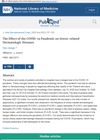 5 citations,
February 2010 in “Expert Review of Dermatology”
5 citations,
February 2010 in “Expert Review of Dermatology” Treating both the mind and skin together, especially by managing stress, can greatly improve outcomes for skin disorders linked to psychological issues.
 41 citations,
March 2010 in “Psychology Research and Behavior Management”
41 citations,
March 2010 in “Psychology Research and Behavior Management” Using psychological treatments can help manage skin conditions along with regular medical care.
 1 citations,
December 2014 in “Klinik Psikofarmakoloji Bülteni-Bulletin of Clinical Psychopharmacology”
1 citations,
December 2014 in “Klinik Psikofarmakoloji Bülteni-Bulletin of Clinical Psychopharmacology” Adding aripiprazole to the treatment improved hair-pulling symptoms in a teenager.
 November 2022 in “PubMed”
November 2022 in “PubMed” The COVID-19 pandemic increased some stress-related skin diseases but didn't affect others.
 83 citations,
January 2001 in “American journal of clinical dermatology”
83 citations,
January 2001 in “American journal of clinical dermatology” Clomipramine may significantly reduce hair-pulling in Trichotillomania, but more research is needed on treatments and early onset cases.
 April 2023 in “JOJ dermatology & cosmetics”
April 2023 in “JOJ dermatology & cosmetics” The conclusion is that a team of skin doctors and psychiatrists is needed to better treat patients with mind-skin disorders.
 22 citations,
November 2014 in “Psychiatric Clinics of North America”
22 citations,
November 2014 in “Psychiatric Clinics of North America” Stress can worsen skin conditions and affect mental health, so doctors should include stress management in skin treatment.
 May 2024 in “Actas dermo-sifiliográficas/Actas dermo-sifiliográficas”
May 2024 in “Actas dermo-sifiliográficas/Actas dermo-sifiliográficas” Effective treatments for trichotillomania include cognitive-behavioral therapy, certain medications, and alternative support tools.
 1 citations,
May 2016 in “Current Opinion in Pediatrics”
1 citations,
May 2016 in “Current Opinion in Pediatrics” Children's hair loss can be caused by various factors and should be treated with appropriate, age-specific methods and psychological support.
May 2015 in “UC Merced Undergraduate Research Journal” Behavioral therapies are more effective than drugs for treating trichotillomania.
November 2024 in “Actas Dermo-Sifiliográficas” N-acetylcysteine and memantine are recommended as safe and effective treatments for trichotillomania.
 December 2023 in “Current psychosomatic research”
December 2023 in “Current psychosomatic research” Psychological interventions can improve the quality of life for women with PCOS.
 2 citations,
January 2023 in “Journal of Education, Health and Sport”
2 citations,
January 2023 in “Journal of Education, Health and Sport” Cognitive-behavioral therapy with habit reversal training is the most effective treatment for trichotillomania.
 128 citations,
September 2013 in “Journal of Clinical Epidemiology”
128 citations,
September 2013 in “Journal of Clinical Epidemiology” The conclusion is that the risk of losing significance in meta-analysis results increases with smaller effects and more missing data, and using the median standard deviation for imputation is recommended.
 April 2016 in “Journal of The American Academy of Dermatology”
April 2016 in “Journal of The American Academy of Dermatology” Different treatments are effective for hair loss conditions, but results vary by individual factors.
 237 citations,
January 2010 in “The Journal of Sexual Medicine”
237 citations,
January 2010 in “The Journal of Sexual Medicine” The report recommends personalized treatment for women's sexual dysfunctions and more research on effective therapies.
20 citations,
August 2015 in “Behaviour change” Cognitions significantly influence Trichotillomania, suggesting cognitive therapies could help.
 8 citations,
September 2021 in “Skin appendage disorders”
8 citations,
September 2021 in “Skin appendage disorders” Trichotillomania treatment is most successful with a mix of behavioral therapy, medication, and social support.
2 citations,
March 2022 in “Indian Journal of Psychiatry/Indian journal of psychiatry” The conclusion is that careful management of both psychiatric and skin conditions is crucial for HIV patients, using medication and interdisciplinary approaches.
 138 citations,
March 2001 in “Clinics in Dermatology”
138 citations,
March 2001 in “Clinics in Dermatology” Hair loss can significantly affect a person's self-esteem and body image, especially in young people, those who value their looks highly, and women.
 28 citations,
August 2009 in “Nursing for Women's Health”
28 citations,
August 2009 in “Nursing for Women's Health” Cognitive behavioral strategies help women with PCOS make lifestyle changes to improve their health.
 3 citations,
December 2001 in “Irish Journal of Psychological Medicine”
3 citations,
December 2001 in “Irish Journal of Psychological Medicine” Trichotillomania is a challenging-to-treat impulse-control disorder where individuals pull out their hair, more common in females, with some treatments showing benefits.
 May 2022 in “European medical journal”
May 2022 in “European medical journal” An 11-year-old girl with Trichotillomania developed a large hairball in her stomach, treated with medication, therapy, and family education.
 1 citations,
November 2023 in “Brain and behavior”
1 citations,
November 2023 in “Brain and behavior” Spironolactone improved cognitive performance and early sleep quality but not manic symptoms, appetite, or body weight in bipolar disorder when added to sodium valproate.
 198 citations,
July 2011 in “Cochrane library”
198 citations,
July 2011 in “Cochrane library” Lifestyle changes can improve body composition, excess male hormone levels, and insulin resistance in women with PCOS.
 1 citations,
August 2004 in “Alternative & complementary therapies”
1 citations,
August 2004 in “Alternative & complementary therapies” Non-drug methods like diet, supplements, and aromatherapy can help manage hair loss and its emotional impact.

Individualized treatment plans, including lifestyle changes and specific medications, are crucial for managing PCOS in adolescents.
 38 citations,
April 2017 in “Journal of The American Academy of Dermatology”
38 citations,
April 2017 in “Journal of The American Academy of Dermatology” Many skin patients have mental health issues, but few dermatologists are well-versed in treating these conditions.
 15 citations,
September 2015 in “Journal der Deutschen Dermatologischen Gesellschaft”
15 citations,
September 2015 in “Journal der Deutschen Dermatologischen Gesellschaft” Skin doctors should recognize and treat conditions like hair-pulling and skin-picking early, often using therapy and medication, to help 50-70% of patients.
 30 citations,
August 2018 in “Dermatology and Therapy”
30 citations,
August 2018 in “Dermatology and Therapy” Better-designed, long-term studies are needed to optimize treatment for trichotillomania and trichophagia.


























